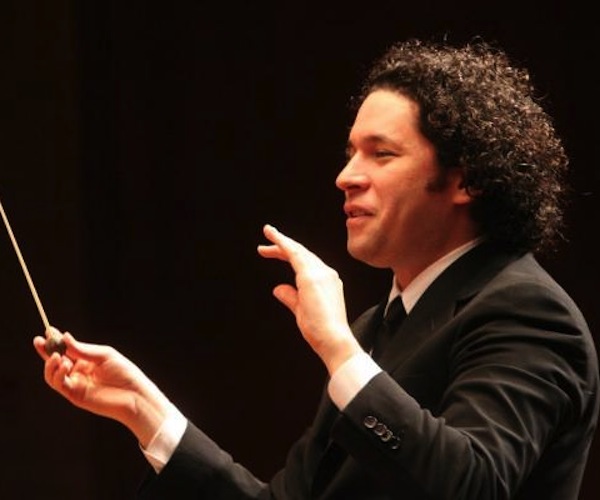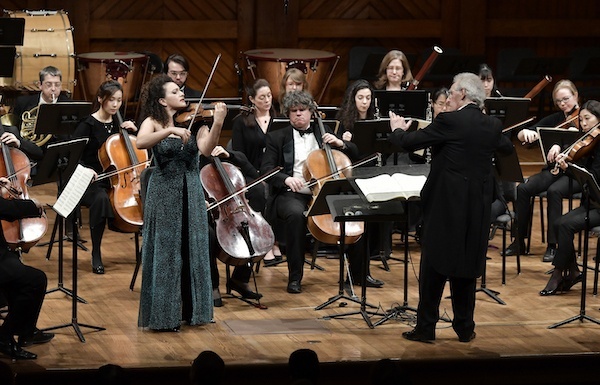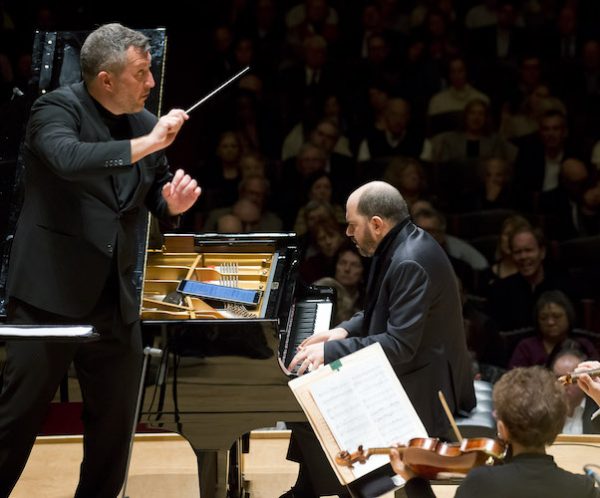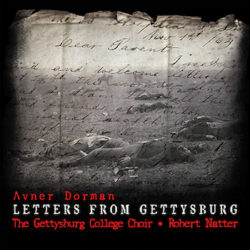Top Classical Concerts and Recordings of 2019
Jonathan Blumhofer and Susan Miron
Classical music continued to thrive, locally and globally, in 2019. Below are the concerts and recordings from the last 12 months that, at year’s end, stand out as the strongest to Susan Miron and me. As always, it’s a consciously incomplete and imperfectly balanced summary, so feel free to add your own to highlights and reminiscences in the Comments section.
Concert of the Year

Gustavo Dudamel — The LA Phil’s Music Director embraces risk. Photo: lapatilla.com
The Los Angeles Philharmonic brought a tremendous program of pieces by Alberto Ginastera, John Adams, and Stravinsky to Symphony Hall in November. They’ve been the country’s most daring orchestra for much of the last 20 years, and this Saturday-afternoon matinee reminded why and how they set the bar so high. Full review here. (SM)
Best Orchestral Performance
If there’s one thing the Boston Symphony and Andris Nelsons do better than just about anybody, it’s Russian music, as their April pairing of works by Dmitri Shostakovich and Sergei Rachmaninoff attested. Their account of the former’s Fifteenth Symphony was a triumph on every level: brimming with sardonic humor, wit, pathos, anger, and terror. Prefacing it was the one-and-only Daniil Trifonov in a kinetic, potent traversal of Rachmaninoff’s Piano Concerto no. 3. Full review here.
Runner up: In June, I followed the Boston Philharmonic Youth Orchestra on its nine-concert tour to Brazil. The third of those performances took place in the spectacular Sala São Paulo and it proved to be one of the BPYO’s defining concerts of this – or any other – year. (JB)
Best Solo Performance

Violinist Liza Ferschtman performing with the Boston Philharmonic Orchestra (BPO). Photo: Paul Marotta.
For rapport between soloist and orchestra (and/or conductor), the fall of 2019 brought two mesmeric programs from the Boston Philharmonic Orchestra. My favorite of those – by a hair – was Liza Ferschtmann’s account of Beethoven’s Violin Concerto in November. Augustin Hadelich played the same piece with the Boston Symphony in September. Then, it was beautifully done, but sterile: his interpretation took no risks; parts of it were even a bit sleepy. Ferschtmann, on the other hand, brought the music to life with a panache and vigor that should be a model for all violinists navigating these well-trod pages. Full review here.
Runners up: The BPO’s October concert series featured Alessandro Deljavan in a full-bore, tempestuous interpretation of Brahms’s Piano Concerto no. 2. Brimming with color, character, and an impeccable sense of musical shape, Deljavan’s reading was bracing – which, given the sometimes-stultifying frequency with which the Brahms Second is played in these parts, says something.
I also adored Lisa Batiashvili’s vivid, sumptuous reading of Karol Szymanowski’s opulent Violin Concerto no. 1 with the BSO back in February. (JB)
Best Choral Performance
The vocal ensemble Skylark brought Sergei Rachmaninoff’s Vespers to Cambridge in October. Their performance was serenely touching, marked by sheer beauty of tone, as well as a close attention to dynamic nuance and terrific technical command of Rachmaninoff’s devotional writing. Full review here. (SM)
Best Opera Performance
Boston Early Music Festival’s November ad hoc stage-work drawn from various early operas based on the Orpheus myth takes the prize for the year’s best operatic performance. Starring countertenor Philippe Jaroussky and soprano Amanda Forsythe, La Storia di Orfeo drew on scenes from Monteverdi, Luigi Rossi, and Antonio Sartorio. Full review here. (SM)
Best Premiere

Thomas Adès conducting pianist Kirill Gerstein and the Boston Symphony Orchestra in a performance of Adès’s Piano Concerto. Photo: Winslow Townson.
The year’s freshest, most brilliant premiere came in March, courtesy of Thomas Adès and Kirill Gerstein. Adès’s Concerto for Piano and Orchestra – a wry, knowing send-up of the 19th-century format filled with knotty, Adès-ian twists – was written for Gerstein, and the keyboardist played it to the hilt. If you ever wondered whether or not new music could be serious and fun (and seriously fun), well, here you go: absolutely. Full review here.
Runners up: Eric Nathan’s Concerto for Orchestra, premiered by the BSO in September, struck me as less of a concerto than a single-movement symphony, but it was a powerful, affecting (and effective) piece that the orchestra is (rightly) reprising at Tanglewood next summer. I’ve also been unable to forget the sheer sonic thrills of Betsy Jolas’s Letters from Bachville, which Andris Nelsons conducted in November. It’s a piece that demands further hearings to fully grasp, but what came across in its debut was scintillating, unendingly fresh, and breathtakingly inventive. (JB)
Best Revival
Charles Ives remains a composer more talked about than played, so it was particularly agreeable that his Pulitzer Prize–winning Symphony no. 3 came to Symphony Hall as part of the last concert of the Boston Philharmonic’s 40th-anniversary season. Benjamin Zander, who’s known as a Mahler interpreter (and who led a scorching Mahler Five after the break that night), conducted a remarkably tight and impressively lucid reading of the Third: its layerings of quotations and disjunct rhythmic patterns came across with clarity. But most impressive was Zander’s command of the music’s structure. This was as cogent, coherent, and dramatic an Ives Three as anyone has conducted, its procession of hymn tunes building with inexorable momentum to a wistful, mystical apotheosis. Full review here. (JB)
Most Creative Program
It’s hard to top Richard Pittman’s programming with either Boston Musica Viva (BMV) or the New England Philharmonic. The former’s Family Concert in March typically features a revival of a previous BMV commission alongside a newly written work. This year’s brought a revival of Hale Smith’s Aboyami as well as the debut of Patrick Greene’s The Druddigon. An allegory about irrational fear, The Druddigon proved thematically timely and musically enchanting. Full review here. (JB)
Top Recordings of 2019 (JB)

American Rage (Warner) – Pianist Conrad Tao’s recital of pieces by Aaron Copland, Frederic Rzewski, and Julia Wolfe were both brilliantly paired and fearsomely played.
Bartok, Ballets (Bis) – Susanna Mälkki’s debut recording with BIS, pairing Bartók’s The Wooden Prince and the suite from The Miraculous Mandarin, was simply magnificent: lush, ferocious, and irresistible.
Berlioz, La damnation de Faust (Warner) – John Nelson conducted two of the best Berlioz albums of the year. This one takes the top prize for Michael Spyres’s exceptional account of the taxing title role: Faust hardly gets better than this.
Bermel, Migrations (Naxos) – No two ways about it: Derek Bermel is a wonderful composer and he’s been well-served with the handful of recordings to have hit the market in recent years. This one superbly showcases his dazzling technical (and stylistic) versatility as well as expressive consistency, with characterful performances of three recent scores that brim with typical freshness and invention.
Busoni, Piano Concerto (Myrios) – One of the best BSO concerts of 2017 featured Kirill Gerstein playing Busoni’s obscenely taxing (and, accordingly, rarely performed) concerto. This recording, drawn from those March performances, perfectly captures the thrilling, beautifully, slightly manic piece in all its Technicolor glory.
Chaplin’s Smile (Warner) – For sheer charm and great fiddling, Philippe Quint’s survey of film music by Charlie Chaplin is as good as it gets (and even rises a notch or two when he and pianist Marta Aznavoorian are joined by Joshua Bell for a couple of numbers).
Eric Coates Orchestral Works, vol. 1 (Chandos) – Coates may be dismissed by some as a lightweight, but the man doesn’t seem to have ever met a tune he couldn’t perfect or score magnificently, and those qualities leap to the fore in this wonderful BBC Philharmonic album, the first installment in what promises to be a comprehensive Coates set.
Ives, Symphonies nos. 3 & 4 (SFS Media) – A new Ives album to mark the last season of Michael Tilson Thomas’s quarter-century-long tenure in San Francisco: serene, mystical, vigorous, unpredictable, timely – this is Ives how he ought to be played.

Gounod, Symphonies nos. 1 & 2 (Chandos) – The two Gounod symphonies remain on the fringes of the repertoire, but they’re handsomely served in Yan Pascal Tortelier’s recording with the Iceland Symphony Orchestra. Fresh, ingratiating, brilliantly played, this disc is sheer joy.
Lortzing, Opera Overtures (Naxos) – This set of nine Albert Lortzing overtures played by the Malmö Opera Orchestra was an early highlight of 2019 and has remained near the top of my playlist since I reviewed it in February. Sweeping, ingratiating, tuneful, they’re as fine as anything in the genre by Weber, Mendelssohn, and Schumann (among others).
Markus Maskuniitty, Concertos for Horn and Orchestra (Ondine) – The horn might be among the most unwieldy instruments in the orchestra. But you’d never know that from Markus Maskuniitty’s brilliant album, in which he (joined by a few colleagues) dispatches some of its most treacherous repertoire – Schumann’s Konzertstück, Gliere’s Horn Concerto – with dazzling ease.
To Paradise for Onions (Etcetera) – This was one of the year’s true gems: a recording of vocal and chamber music by the now-92-year-old Edith Hemenway. Each item on the recording is crafted with beguiling delicacy and fervently played (or sung).
Transatlantic (CSO Media) – Louis Langree and the Cincinnati Symphony dispatch a brilliant program of pieces by Gershwin, Varese, and Stravinsky with aplomb. What more need be said?
Wolfe, Fire in my mouth (Decca) – Wolfe’s oratorio premiered in New York in January and manages to be both musically gripping and politically charged. A memorial to the 146 women killed in the 1911 Triangle Shirtwaist Company fire, Fire in my mouth tackles themes of immigration, religious bias, industrialization, labor rights, and more with a subtlety and directness that’s haunting.
Yiddish Cabaret (Harmonia mundi) – The title here didn’t make much sense (what, exactly, is the relationship between Yiddish cabaret and Erich Wolfgang Korngold’s urbane String Quartet no. 2?), but the selections, which, in addition to the Korngold, included pieces by Erwin Schulhoff and Leonid Desyatnikov, were fresh and magnificently played by the Jerusalem Quartet.
Zimmermann, Violin Concerto etc. (Ondine) – One of 2019’s early highlights was this album featuring Leila Josefowicz playing Zimmermann’s ferocious, dense, sardonic Concerto. It’s a piece that requires a sympathetic advocate to really come off; with Josefowicz and conductor Hannu Lintu leading the Finnish Radio Symphony, it (and the remainder of the program – Zimmermann’s Photoptosis and the vocal symphony drawn from his opera Die Soldaten) had more than a few.
Top Recordings of 2019 (SM)

Bach, Toccatas (Hyperion) Mahan Estefani, harpischordist.
Dorman, Letters from Gettysburg (Canary Classics) Avner Dorman (composer).
Free America! (Harmonia mundi) Boston Camerata/ Anne Azéma.
Handel, Messiah (Harmonia mundi) Jordi Savalle (conducting).
Janacek, The Diary of One Who Disappeared (Hyperion) Nicky Spence, tenor, Julius Drake, pianist.
Shostakovich & Kabalevsky, Cello Sonatas (Hyperion) Steven Isserlis, cellist, Ollie Mustonen, pianist.
Jonathan Blumhofer is a composer and violist who has been active in the greater Boston area since 2004. His music has received numerous awards and been performed by various ensembles, including the American Composers Orchestra, Kiev Philharmonic, Camerata Chicago, Xanthos Ensemble, and Juventas New Music Group. Since receiving his doctorate from Boston University in 2010, Jon has taught at Clark University, Worcester Polytechnic Institute, and online for the University of Phoenix, in addition to writing music criticism for the Worcester Telegram & Gazette.
Susan Miron, a harpist, has been a book reviewer for over 20 years for a large variety of literary publications and newspapers. Her fields of expertise were East and Central European, Irish, and Israeli literature. Susan covers classical music for The Arts Fuse and The Boston Musical Intelligencer. She is part of the Celtic harp and storytelling duo A Bard’s Feast with renowned storyteller Norah Dooley and, until recently, played the Celtic harp at the Cancer Center at Newton Wellesley Hospital.
